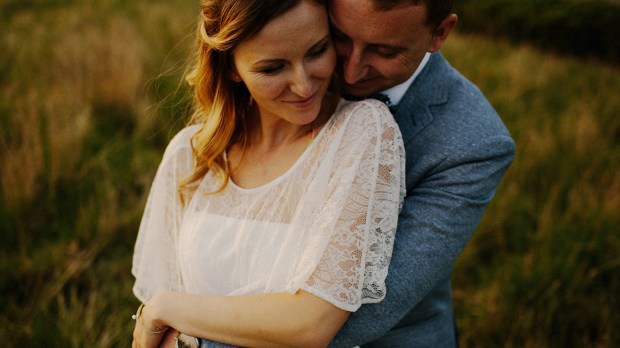My wedding was 100 days away. Dress bought. Deposits made. Honeymoon booked. While the event planner in me knew the wedding would be an amazing success, the realist in me recognized during the engagement that the marriage would not succeed. Finding the courage to make that one difficult decision to walk away improved my entire life.
I heard countless relationship stories in the days and months that passed after saying “I don’t.” Those, combined with watching other couples and the process of dating, being engaged, and calling off a wedding taught me valuable relationship lessons. Here are my top 10:
1. A wedding is a day, a marriage is forever. Plan accordingly.
Most couples spend more time planning their wedding and honeymoon than discussing partner expectations, setting in-law boundaries, managing a budget, handling conflict, etc. Taking a good marriage prep class as a serious relationship investment — not a last-minute box to check — is important, regardless of how long a couple has been together. A couple must proactively enter a marriage thinking it is forever — not as a default expectation with an escape clause (minus a few horrible situations). They must agree that bumps are bumps, not the beginning of the end. They commit to each other and marriage itself.
2. “When people show you who they are, believe them the first time.” — Maya Angelou
If he acts like a mama’s boy, believe he is a mama’s boy — a ring will not change that. If his father is an abusive jerk, know that influences his views on being a husband/father. If fun is only had while drinking, recognize that. It reverses, too. We (particularly women) often project our preferred ideals onto our partners, without realizing those qualities and our actual partners are mismatched. Relationships are about loving him for exactly who he is now. We all inherit good and bad traits from our families. We should note parental roles, family interactions, and conflict styles, as they provide a better understanding of our partner. Recognizing family history, patterns, and relationship needs is critical for a couple’s future.
3. Falling in love is easy. Staying in love requires kindness and generosity.
Bodies need exercise. Lawns need watering. Marriages need work. The June 12, 2014 article in The Atlantic, “Masters of Love,” found that kindness and generosity were the two traits needed for a lasting relationship. Researchers studied and separated couples into two groups. While the “masters” were happily together after six years of marriage, the “disasters” were either over or chronically unhappy. The biggest difference found was that the masters brought a spirit of kindness and generosity to the relationship, while the disasters brought contempt, criticism, and hostility.
4. Know those personal non-negotiables and do not settle.
Non-negotiables are different for everyone, and only that person can decide their “must have” relationship boxes. Occasionally, evaluate whether those non-negotiables are being met — like after the first, third, and sixth month. Ask: Does he make me a better person? Is it just nice to do something or do I genuinely like spending time with HIM? What have I given up/gained from this relationship? Someone can be a great significant other, without being The One. A person can also be very lonely in the wrong relationship. It is hard to meet Mr. Right when focused on Mr. Right Now.
5. Only you can complete you.

Thanks to Jerry Maguire, the idea of “completion” is romantic. Partners should make us better and happier; however, if a person is unhappy, no one can make them permanently happy. Understanding the ME, and being comfortable alone, is important before becoming a WE. Furthermore, everyone brings baggage into a relationship — past broken hearts, addictions, anxieties, work devotions, etc. Whatever the baggage, try to understand its roots and own it. Someone worthwhile will help us unpack. Finally, regardless of relationship status, it is always good to occasionally make ME time to unplug and focus on personal goals.
6. Change is for the pocket, not a spouse.
A person marries a partner, not a project. Couples should grow individually and together. However, expecting to drastically change a partner is like thinking a person can happily become a morning person or a night owl instantaneously. He must want change. That belittling attitude, yielding to mom/dad, or inconsideration may seem insignificant or even manageable when dating — maybe it is a pebble in the shoe — but over time, will it feel like a boulder? Think beyond romantic bliss to the long-term. Changing someone is also trying to control, and no one wants to open up and form a deeper connection with someone trying to control them.
7. Walking away is easier than misery or divorce.
It may seem difficult, embarrassing, shameful, or a host of other emotions, but breaking up is easier, cheaper, and less emotional than a divorce. Hope can fill us with excitement for a new beginning and it can also fantasize our minds into false expectations that he could be as perfect three years in as the first date. Marriage is far from a Disney fairytale. Admit to the day-to-day reality and ask — if nothing changed, would I want to REmarry this person in five years? Note: A person seldom regrets efforts to keep it classier while walking away.
8. Ensure the relationship is built on a rock.

Cars and bodies need regular check-ups, and so do relationships. A worthwhile pre-marital counseling course will help couples get closer to the same page and offer remarkable perspective. Faith, hope, and love cannot keep a couple together if they are choosing when to trust or communicate. Half of marriages end in divorce, but what is less known is half of those marriages end in seven years, and the average couple waits six years to get marital counseling, according to the Gottman Institute. Couples can and do successfully navigate problems, monsters-in-law, etc., but partners must be united and sometimes seek outside help.
9. Butterflies disappear, honeymoons end, and expectations go unmet.
One woman I know was so focused on a ring, I doubt she thought about actual marriage. She was cheating after 2.5 years because he no longer gave her butterflies, and then divorced. A man I know rebounded from a broken relationship with a woman still hurting from a past relationship. After a few months, he realized he wanted out — except, desperate for lasting love, she intentionally got pregnant. Temporarily filling a void to mask pain became a lifetime sentence because he let his honeymoon period endorphins dictate. Intimate relationships develop after the honeymoon ends, butterflies disappear, and realistic expectations are set.
10. Do not just recite that popular wedding verse — BE the love of 1 Corinthians every day.
My priest wisely said, “We do not marry a perfect person, we love an imperfect spouse.” Marriage is more than an attraction, shared interests, and/or what comes next, everyone is doing it, or is better than being alone. Marriage is giving and forgiving. Putting WE before ME. Marriage is the verb of love. Not just the romantic, getting to know someone love, but the intimate, committed to my spouse’s greatness, fight for — not with — my partner, been seen at my worst, knows my flaws, love. Each person must work daily to be the love of 1 Corinthians and try harder when they fail…
I am always patient and kind to my partner. I do not envy. I do not boast. I am not proud. I will not dishonor my partner. I am not self-seeking. I will not be easily angered by my partner. I will not keep a record of my partner’s wrongs. I will not delight in evil but rejoice with the truth of my partner. I will always protect my partner, trust my partner, and have hope for our marriage. I will commit 100 percent to helping us always persevere.
Also read the prelude to this article, Why I called off my wedding (and why sharing the story helps)

Read more:
7 Pitfalls to avoid when spiritually preparing for your wedding day

Read more:
Suffering a breakup? Knowing your attachment style could ease the pain

